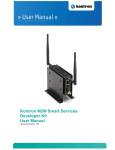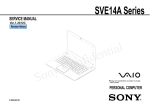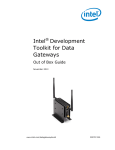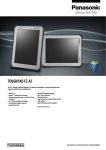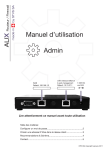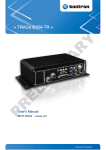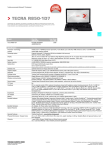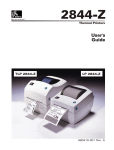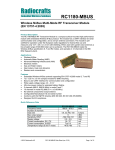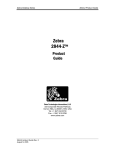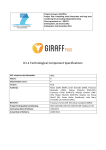Download Intel Development Toolkit for Data Gateways User Manual
Transcript
Intel® Development Toolkit for Data Gateways User Manual November 2013 Document Number: 329796-001 INFORMATION IN THIS DOCUMENT IS PROVIDED IN CONNECTION WITH INTEL PRODUCTS. NO LICENSE, EXPRESS OR IMPLIED, BY ESTOPPEL OR OTHERWISE, TO ANY INTELLECTUAL PROPERTY RIGHTS IS GRANTED BY THIS DOCUMENT. EXCEPT AS PROVIDED IN INTEL'S TERMS AND CONDITIONS OF SALE FOR SUCH PRODUCTS, INTEL ASSUMES NO LIABILITY WHATSOEVER AND INTEL DISCLAIMS ANY EXPRESS OR IMPLIED WARRANTY, RELATING TO SALE AND/OR USE OF INTEL PRODUCTS INCLUDING LIABILITY OR WARRANTIES RELATING TO FITNESS FOR A PARTICULAR PURPOSE, MERCHANTABILITY, OR INFRINGEMENT OF ANY PATENT, COPYRIGHT OR OTHER INTELLECTUAL PROPERTY RIGHT. A "Mission Critical Application" is any application in which failure of the Intel Product could result, directly or indirectly, in personal injury or death. SHOULD YOU PURCHASE OR USE INTEL'S PRODUCTS FOR ANY SUCH MISSION CRITICAL APPLICATION, YOU SHALL INDEMNIFY AND HOLD INTEL AND ITS SUBSIDIARIES, SUBCONTRACTORS AND AFFILIATES, AND THE DIRECTORS, OFFICERS, AND EMPLOYEES OF EACH, HARMLESS AGAINST ALL CLAIMS COSTS, DAMAGES, AND EXPENSES AND REASONABLE ATTORNEYS' FEES ARISING OUT OF, DIRECTLY OR INDIRECTLY, ANY CLAIM OF PRODUCT LIABILITY, PERSONAL INJURY, OR DEATH ARISING IN ANY WAY OUT OF SUCH MISSION CRITICAL APPLICATION, WHETHER OR NOT INTEL OR ITS SUBCONTRACTOR WAS NEGLIGENT IN THE DESIGN, MANUFACTURE, OR WARNING OF THE INTEL PRODUCT OR ANY OF ITS PARTS. Intel may make changes to specifications and product descriptions at any time, without notice. Designers must not rely on the absence or characteristics of any features or instructions marked "reserved" or "undefined". Intel reserves these for future definition and shall have no responsibility whatsoever for conflicts or incompatibilities arising from future changes to them. The information here is subject to change without notice. Do not finalize a design with this information. The products described in this document may contain design defects or errors known as errata which may cause the product to deviate from published specifications. Current characterized errata are available on request. Contact your local Intel sales office or your distributor to obtain the latest specifications and before placing your product order. Copies of documents which have an order number and are referenced in this document, or other Intel literature, may be obtained by calling 1-800-548-4725, or go to: http://www.intel.com/design/literature.htm Centrino, Intel, the Intel logo, and Intel Atom are trademarks of Intel Corporation in the U.S. and/or other countries. *Other names and brands may be claimed as the property of others. Copyright © 2013, Intel Corporation. All rights reserved. Intel® Development Toolkit for Data Gateways User Manual 2 November 2013 Document Number: 329796-001 Contents 1 Introduction ................................................................................................... 6 1.1 1.2 1.3 1.4 1.5 1.6 2 Development Toolkit Components ............................................................. 9 Development Toolkit Feature Summary .................................................... 11 Kontron M2M System Ports and Connectors .............................................. 11 Antennas .............................................................................................. 16 Power Adapter ....................................................................................... 16 System Cooling ..................................................................................... 17 Processor and Memory ........................................................................... 17 USB Flash Drive ..................................................................................... 18 Included Documentation ......................................................................... 18 Component Installations............................................................................... 19 3.1 3.2 3.3 3.4 3.5 4 6 6 7 7 7 8 Product Description ........................................................................................ 9 2.1 2.2 2.3 2.4 2.5 2.6 2.7 2.8 2.9 3 About this Manual ................................................................................... Manual Organization................................................................................ Product Documentation ........................................................................... Safety Information .................................................................................. Development Toolkit Contents .................................................................. Acronyms .............................................................................................. Before You Begin ................................................................................... 19 3.1.1 Tools and Supplies Needed ........................................................ 19 3.1.2 System References ................................................................... 19 Installing Antennas ................................................................................ 19 Installing the Power Adapter (Power Brick) ............................................... 21 Installing User Added Options .................................................................. 21 3.4.1 Installing a MicroSD card ........................................................... 21 3.4.2 Installing a Headphone .............................................................. 21 3.4.3 Installing a SIM Card ................................................................ 21 Installing the Software Tools (onto a Host PC) ........................................... 24 Operating Guide............................................................................................ 25 4.1 4.2 4.3 4.4 4.5 4.6 4.7 4.8 4.9 Turning On the Kontron M2M System ....................................................... 25 Connecting a Development Host PC to the Kontron M2M System ................. 25 Connecting to the Kontron M2M System Wi-Fi ........................................... 26 Turning Off the Kontron M2M System ....................................................... 26 Indicator Lights ..................................................................................... 26 Kontron M2M System BIOS ..................................................................... 27 4.6.1 UEFI BIOS ............................................................................... 27 4.6.2 Boot Loader Support ................................................................. 27 4.6.3 Determining the BIOS Version .................................................... 27 4.6.4 AMI BIOS Setup Utility .............................................................. 27 Wind River Development Tools ................................................................ 28 Web Management Utility for System Provisioning ....................................... 29 Drivers/Utilities/Command Support .......................................................... 29 November 2013 Document Number: 329796-001 Intel® Development Toolkit for Data Gateways User Manual 3 5 PCIe MiniCard 3G Module Installation .......................................................... 31 5.1 5.2 5.3 5.4 5.5 5.6 5.7 5.8 5.9 6 Ericsson 3G Module Included ................................................................... 31 3G Wireless Drivers and BIOS support ...................................................... 31 Before You Begin ................................................................................... 31 5.3.1 Tools and Supplies Needed ........................................................ 31 5.3.2 System References ................................................................... 32 5.3.3 3G Installation Overview ........................................................... 32 5.3.4 Safety Information.................................................................... 32 Removing the Chassis Cover ................................................................... 32 Removing the AV Card............................................................................ 34 Antenna Cable Routing ........................................................................... 35 Attaching and Installing the Module.......................................................... 36 Reattaching the AV Board ....................................................................... 38 Re-installing the Chassis Covers .............................................................. 40 Troubleshooting............................................................................................ 42 6.1 6.2 6.3 6.4 7 Resetting the System ............................................................................. 42 Problems Following Initial System Installation ........................................... 43 6.2.1 First Steps Checklist.................................................................. 43 Hardware Diagnostic Testing ................................................................... 43 6.3.1 Confirming the Operating System Load ....................................... 44 Specific Problems and Corrective Actions .................................................. 44 6.4.1 Power Light does not Light ......................................................... 44 6.4.2 No Characters Appear on Screen ................................................ 44 6.4.3 Characters are Distorted or Incorrect .......................................... 45 6.4.4 Cannot Connect to the Kontron M2M System using Ethernet Connector ................................................................................ 45 6.4.5 Diagnostics Pass but the Connection Fails .................................... 45 6.4.6 Cannot Connect to the Kontron M2M System using Wi-Fi ............... 45 6.4.7 Cannot connect to the Kontron M2M System using 3G ................... 46 6.4.8 Problems with Newly Installed Application Software ...................... 46 6.4.9 Problems with Application Software that Ran Correctly Earlier ........ 47 Getting Help ................................................................................................. 48 Figures Figure Figure Figure Figure Figure Figure Figure Figure Figure Figure Figure Figure Figure Figure Figure 1. 2. 3. 4. 5. 6. 7. 8. 9. 10. 11. 12. 13. 14. 15. Open Kit with Tray ............................................................................................ 10 Open Kit without Tray ....................................................................................... 10 Kontron M2M System with 802.11/802.15.4 Antennas .......................................... 10 Kontron M2M System – Side views with reference to the Label ............................... 12 Kontron M2M System Label (close-up of the 2.25-inch label).................................. 12 Kontron M2M System Top View .......................................................................... 13 Kontron M2M System – View of Ethernet/Power End ............................................. 14 Kontron M2M System – View of A/V Port End ....................................................... 15 Kontron M2M System – Bottom View................................................................... 16 Kontron M2M System Power Adapter and Power Cords .......................................... 17 Kontron M2M System with 2x 802.11/802.15.4 Antennas ...................................... 20 Kontron M2M System with 2x 802.11/802.15.4 Antennas Installed ......................... 20 Kontron M2M System with 802.11/802.15.4 and 3G Antennas Installed .................. 20 Positioning of the SIM Card Pre-Insertion in the Kontron M2M System ..................... 22 Beginning to Insert SIM Card in the Kontron M2M System ..................................... 22 Intel® Development Toolkit for Data Gateways User Manual 4 November 2013 Document Number: 329796-001 Figure Figure Figure Figure Figure Figure Figure Figure Figure Figure Figure Figure Figure Figure Figure Figure Figure 16. 17. 18. 19. 20. 21. 22. 23. 24. 25. 26. 27. 28. 29. 30. 31. 32. SIM Card Half-Inserted in the Kontron M2M System .............................................. 23 Unscrew the two top screws ............................................................................... 33 Unscrew the two bottom screws ......................................................................... 33 Remove side screw ........................................................................................... 33 Kontron M2M System and Chassis Cover ............................................................. 34 Remove AV Card Screw ..................................................................................... 34 Antenna Cable Routing when there is no 3G module installed ................................. 35 Antenna Cable Routing Supporting 3G Usage ....................................................... 35 Attach the 3G Module Card ................................................................................ 36 Attached 3G Module Card .................................................................................. 36 Remove the spacer screw prior to positioning the 3G module ................................. 37 Position the module so that the screw holes are aligned ........................................ 37 Screw the 3G module into place ......................................................................... 38 Align the AV board for re-attachment .................................................................. 39 Holding the AV board in place............................................................................. 39 The Kontron M2M System with the 3G module fully installed .................................. 40 The Kontron M2M System with the 3G module fully installed and spacer removed..... 41 Tables Table Table Table Table Table Table 1. 2. 3. 4. 5. 6. Development Development Kontron M2M Kontron M2M Kontron M2M Kontron M2M Toolkit Components ........................................................................ 9 Toolkit Features Summary .............................................................. 11 System – Top View Features ........................................................... 13 System - Ethernet/Power End Features ............................................ 14 System – A/V Port End Features ..................................................... 15 System - Antenna Placement .......................................................... 20 Revision History Date Revision Description November 2013 001 Minor edits; changed document classification level August 2013 1.0 Initial release § November 2013 Document Number: 329796-001 Intel® Development Toolkit for Data Gateways User Manual 5 Introduction 1 Introduction 1.1 About this Manual Thank you for purchasing and using the Intel® Development Toolkit for Data Gateways. This manual is for smart services developers who are responsible for using the development toolkit. This document provides a brief overview of the features of the system followed by a list of accessories or other components you may need or want to purchase. It also includes instructions for how to add or replace components in the Kontron machine-to-machine (M2M) system hardware, and troubleshooting information. Note: The latest versions of all documents, and other product information, are available for download from the Development Toolkit website (see http://www.intel.com/datagatewaydevkit). 1.2 Manual Organization Chapter 2 - Product Description The chapter provides a brief overview of the Intel Development Toolkit for Data Gateways. In this chapter, you will find a list of the features, illustrations of the product, and product diagrams to help you identify components and their locations. Chapter 3 - Component Installation The chapter provides instructions for installing the antennas and an optional SIM card. This chapter also includes instructions for installing the included Wind River development software onto a development host PC. Chapter 4 - Operating Guide The chapter covers Kontron M2M System* power-on and connection to a development host PC. Wind River development tools and utilities that are shipped with the system are briefly covered. The chapter also includes information on system BIOS and drivers. Chapter 5 - PCIe MiniCard 3G Module Addition/Replacement The chapter provides instructions for adding or replacing internal PCI Express* cards and components, such as a 3G module. Refer to this chapter for step-by-step instructions and diagrams for installing or replacing internal components. Chapter 6 - Troubleshooting The chapter provides troubleshooting information. It contains suggestions for performing troubleshooting activities to identify the source of a problem. Chapter 7 - Getting Help This chapter details where the user can turn for assistance. Intel® Development Toolkit for Data Gateways User Manual 6 November 2013 Document Number: 329796-001 Introduction 1.3 Product Documentation For product information, please refer to the following documents: • User Manual (this document) • Out of Box Guide • Wind River* Intelligent Device Platform XT* Programmers Guide (available on the Host Development PC after installation of the software) • Kontron M2M Smart Services Module Warranty, Safety, and Regulatory Information The latest versions of the documents, software updates, and other product information are available for download from the Development Toolkit website (see http://www.intel.com/datagatewaydevkit). 1.4 Safety Information Safety information is included in this user manual where it is relevant. Additional safety information is included in the Kontron M2M Smart Services Module Warranty, Safety, and Regulatory Information document provided in this kit. The latest version of the safety document is available on the Development Toolkit website (see http://www.intel.com/datagatewaydevkit). Warning: Please read and adhere to all safety instructions provided in this user manual and in the Kontron M2M Smart Services Module Warranty, Safety, and Regulatory Information document provided in this kit. 1.5 Development Toolkit Contents The Intel® Development Toolkit for Data Gateways includes the following: • One Kontron M2M System. Note: The system is manufactured by Kontron, and comes preloaded with a Wind River Intelligent Device Platform XT* 1.0 system image. • • • • • • One USB flash drive with Wind River Intelligent Device Platform XT 1.0 installation software One power adapter with U.S. and European power cords Two 802.11/802.15.4 antennas Two 3G antennas with adapters Two Micro USB to USB adapter cables One Micro HDMI to HDMI adapter cable See Chapters 3 and 4 for initial hardware and software installation and configuration instructions. November 2013 Document Number: 329796-001 Intel® Development Toolkit for Data Gateways User Manual 7 Introduction 1.6 Acronyms The following table lists acronyms used in this manual. Acronym AV Description Audio/Video BIOS Basic Input/Output System BMC Baseboard Management Controller DVI EDGE Digital Video Interface Enhanced Data Rates for GSM Evolution ESD Electrostatic Discharge HDA High Definition Audio HDMI High Definition Multimedia Interface HDTV High Definition Television HSPA High Speed Packet Access LVDS Low Voltage Data Signal (video) M2M Machine to Machine S/PDFI SATA SSD SDVO Potentially Degraded Frame Indication Serial Advanced Technology Attachment Solid State Drive Serial Digital Video Output SIM Subscriber Identity Module SKU Stock Keeping Unit UEFI Unified Extensible Firmware Interface UM WAN WCDMA Unified Memory Wide Area Network Wideband Code Division Multiple Access § Intel® Development Toolkit for Data Gateways User Manual 8 November 2013 Document Number: 329796-001 Product Description 2 Product Description This chapter briefly describes the main features of the Intel® Development Toolkit for Data Gateways. It provides a diagram of the product, a list of the Intel Development Toolkit for Data Gateways features, and a diagram showing the location of important components and connections on the Kontron M2M System. 2.1 Development Toolkit Components Figures 1 and 2 show the Intel Development Toolkit for Data Gateways with lid open to show the internal components. Table 1 lists the components and their locator labels. Table 1. Development Toolkit Components Item Description Item Description A Kontron2M M2M System E USB flash drive B Power Adapter F 3G antennas (2) C European power cord G 802.11/802.15.4 antennas (2) D U.S. power cord H In-box literature Not pictured Micro HDMI to HDMI Cable November 2013 Document Number: 329796-001 Not pictured Micro USB to USB Cables (2) Intel® Development Toolkit for Data Gateways User Manual 9 Product Description Figure 1. Open Kit with Tray Figure 2. Open Kit without Tray H E F G A C B D Figure 3. Kontron M2M System with 802.11/802.15.4 Antennas Intel® Development Toolkit for Data Gateways User Manual 10 November 2013 Document Number: 329796-001 Product Description 2.2 Development Toolkit Feature Summary Table 2 summarizes the major features of the hardware contained in the Intel Development Toolkit for Data Gateways. Table 2. Development Toolkit Features Summary Feature Description Dimensions with mounting brackets: Dimensions (H x W x D) and Weight 67mm x 100mm x 27mm (92mm x 100mm x 62mm) System Weight: 0.8 lb. (0.36 kg) Packaged Kit Weight: 2.35 lb. (1.1 kg) These dimensions do not include the antennas or the antenna connectors. Interfaces SIM slot, USB 2.0, Micro USB 2.0 host, Power, RJ-45 Ethernet, Microphone, Headphone/Line Out, 2x Micro HDMI, MicroSD slot, Micro USB 2.0 client, 2x antenna connectors Controls Reset button, user input button (software-enabled) Internal Storage 4 GB (on an internal MicroSD card) Power Adapter Processor and Chipset 100-240 V AC, 50/60 Hz input; 12 V DC, 2A output (U.S. and Continental Europe power cords included) Intel® Atom™ Processor E620 (600 MHz) with Intel® Platform Controller Hub EG20T Intel® Centrino® Advanced N 6205 Wi-Fi* module installed; Radios Texas Instruments CC2531* SoC, ready for ZigBee* or 6LoWPAN* (note the ‘W’) or WirelessHART* WPAN use; Ericsson F5521gw* 3G module installed; Option to drop-in other PCI Express 3G/4G broadband module 2.3 Expansion One PCIe* Mini Card slot for WWAN 3G/4G broadband module (certification/drivers needed) or solid state disk addition Accelerometer Ultra low-power, high-performance, three axis, linear accelerometer Kontron M2M System Ports and Connectors This section contains photos and diagrams to assist in port and connector identification. November 2013 Document Number: 329796-001 Intel® Development Toolkit for Data Gateways User Manual 11 Product Description Figure 4. Kontron M2M System – Side views with reference to the Label Figure 5. Kontron M2M System Label (close-up of the 2.25-inch label) Intel® Development Toolkit for Data Gateways User Manual 12 November 2013 Document Number: 329796-001 Product Description Figure 6. Kontron M2M System Top View D B C Table 3. A E Kontron M2M System – Top View Features Item Description Item Description A 3G/4G SIM slot D Client USB Port for Serial Redirection (selected SKUs only) B Reset button E Indicator Lights (10 in a row) For Reference (left-to-right): 1x Bi-color Status/Disk activity 3x WLAN activity LEDs 3x WWAN activity LEDs 3x WPAN activity LEDs C November 2013 Document Number: 329796-001 Input button (software enabled) Intel® Development Toolkit for Data Gateways User Manual 13 Product Description Figure 7. Kontron M2M System – View of Ethernet/Power End E C B D A F Table 4. Kontron M2M System - Ethernet/Power End Features Item Description Item A USB 2.0 Host Port for Serial Redirection (selected SKUs only) D USB 2.0 Host Micro USB Port B Power E 2.4 GHz Antenna Connector (Primary 802.11/Wi-Fi Antenna) C RJ-45 Ethernet Port F Auxiliary 3G or Wi-Fi connector Intel® Development Toolkit for Data Gateways User Manual 14 Description November 2013 Document Number: 329796-001 Product Description Figure 8. Kontron M2M System – View of A/V Port End Table 5. Kontron M2M System – A/V Port End Features Item Item Description Headphone/Line Out Jack D Primary Micro HDMI port (closest to the Micro USB port) (Supports Terminal Output Messages.) B Microphone Jack E Client USB Debug Port (Reserved for Future Use) C MicroSD Slot F 2.4 GHz Antenna Connector (for 802.15.4/WPAN communications) G Primary 3G Antenna Connector A Description November 2013 Document Number: 329796-001 Secondary Micro HDMI port (close to the antenna connector) Intel® Development Toolkit for Data Gateways User Manual 15 Product Description Figure 9. Kontron M2M System – Bottom View As shown in Figure 9, there are mounting holes at each of the corners of the brackets. Note that a security slot for a lock is also accessible on the bottom of the system. 2.4 Antennas There are two antennas for 802.11 (WLAN) and 802.15.4 (WPAN) connectivity, and two antennas for 3G cellular connectivity in each Intel® Development Toolkit for Data Gateways. Caution: The antennas supplied with the kit are the only antennas approved to be used with the device. Use of any other antennas will void the regulatory approvals. 2.5 Power Adapter Caution: The power adapter included with the Intel® Development Toolkit for Data Gateways is 100-240 Volts AC, 50/60 Hz input, 12 Volts DC, 2 Amp output. No other power adapter should be used beyond what has been provided with the kit. Use the appropriate cord for your geography. Any IEC320-C7 power cord with appropriate safety agency rating is acceptable for use, but do not use the IEC320C7-PW cords that are squared on one side. Figure 10 shows the power adapter and power cords supplied with the Kontron M2M System. Intel® Development Toolkit for Data Gateways User Manual 16 November 2013 Document Number: 329796-001 Product Description Figure 10. 2.6 Kontron M2M System Power Adapter and Power Cords System Cooling The system is passively cooled. There are no system fans. It is important that the Kontron M2M System have adequate ventilation, so be careful when mounting the system to avoid blocking the air vents. 2.7 Processor and Memory Processor The system board in the Kontron M2M System uses an Intel® Atom™ Processor E620 (600 MHz). Memory The system board in the Kontron System M2M System supports 1GB of DDR2 memory. November 2013 Document Number: 329796-001 Intel® Development Toolkit for Data Gateways User Manual 17 Product Description 2.8 USB Flash Drive The USB flash drive included in the Intel® Development Toolkit for Data Gateways provides access to Wind River Intelligent Device Platform XT 1.0 development environment and tools. The development environment setup is explained in Chapter 3 of this manual. The USB flash drive contains the Intelligent Device Platform XT 1.0 installer. After successful installation on a Linux* host system, the following software and documentation is available: 2.9 o Intelligent Device Platform XT 1.0 o Wind River Linux o Wind River Workbench* development suite o A board support package for the Kontron M2M System o Intelligent Device Platform XT 1.0 documentation (PDF file format) o Wind River documentation for Wind River Workbench and Wind River Linux (PDF file format) o A recovery image to allow you to rewrite the internal MicroSD with the factory image for the MicroSD (.img file format) Included Documentation Documentation available in the development kit box includes: • • • An Out-of-Box Guide A Development Kit User Manual (this document) A Warranty, Safety and Regulatory Pamphlet For the latest versions of these documents, please visit the product webpage at: http://www.intel.com/datagatewaydevkit. § Intel® Development Toolkit for Data Gateways User Manual 18 November 2013 Document Number: 329796-001 Component Installations 3 Component Installations This chapter covers installation of components included in the box and user added components that do not require removal of the chassis cover. All items covered in this chapter may be installed without opening the chassis. See Chapter 6 for information about adding/replacing a 3G module. 3.1 Caution: 3.1.1 Before You Begin Before working with your Intel® Development Toolkit for Data Gateways, pay close attention to the safety information provided in this document and in the provided document: Kontron M2M Smart Services Module Warranty, Safety, and Regulatory Information. Tools and Supplies Needed No tools are needed. 3.1.2 System References All references to sides are consistent with documents listed in Section 2.3. 3.2 Installing Antennas To install the antennas, remove them from the plastic covers and screw them into the antenna connectors. Caution: The antennas supplied with the kit are the only antennas approved to be used with the device. Use of any other antennas will void the regulatory approvals. Figure 11 and Figure 12 show the Kontron M2M System and the 2x 802.11/802.15.4 antennas that accompany every kit. Antennas should be screwed in to the top antenna connectors on either side of the systems. The antennas have an elbow so that they can be aimed as needed or left straight. A good starting point is to aim both antennas up as shown in Figure 13. The flexibility of being able to aim the antennas in different directions may be needed if the unit mounting necessitates antenna direction changes for improved coverage. 3G antennas (if provided as part of the SKU) should be connected to the bottom connectors. November 2013 Document Number: 329796-001 Intel® Development Toolkit for Data Gateways User Manual 19 Component Installations Figure 11. Kontron M2M System with 2x 802.11/802.15.4 Antennas Figure 12. Kontron M2M System with 2x 802.11/802.15.4 Antennas Installed Figure 13 shows both 802.11/802.15.4 antennas directed upward and the 3G antennas pointing outward. The 3G antennas do not bend. Figure 13. Kontron M2M System with 802.11/802.15.4 and 3G Antennas Installed C A B Table 6. Item A B D Kontron M2M System - Antenna Placement Description 2.4 GHz Antenna Connector (for 802.15.4/WPAN communications) This connector is next to the Headphone Jack Primary 3G Antenna Connector Intel® Development Toolkit for Data Gateways User Manual 20 Item C D Description 2.4 GHz Antenna Connector (primary antenna for 802.11/Wi-Fi) This connector is next to the RJ-45 connector Auxiliary 3G Antenna Connector or Auxiliary Wi-Fi Antenna Connector November 2013 Document Number: 329796-001 Component Installations 3.3 Installing the Power Adapter (Power Brick) WARNING: Do not attempt to modify or use an AC power cord set that is not the exact type supplied. Note that the power adapter in the kit is a Delta EADP-24MB A*. The power adapter that accompanies the Intel® Development Toolkit for Data Gateways is the only one that should be used. Use of any other power adapter invalidates the certifications and may be dangerous. To install the power adapter (external power brick) follow these steps: 1. Attach the cord for your geography to the power adapter. The power adapter is external to the Kontron M2M System, and is a brick style. 2. Insert the power adapter plug into the power socket on the top of the Kontron M2M System. 3. Plug in the cord to the wall socket. 3.4 Installing User Added Options 3.4.1 Installing a MicroSD card Additional data storage is possible by inserting a microSD card with storage capacity of up to 4GB in the slot on the side of the system. 3.4.2 Installing a Headphone A headphone may be connected using the 3.5mm headphone jack provided on the side of the system. 3.4.3 Installing a SIM Card Most countries worldwide have one or more operators that support 3G data services; please check with your local operator as to whether the operator supports HSPA, WCDMA or EDGE data services. All three are supported by the Ericcson F5521gw cellular module included in the Kontron M2M System. Please obtain your SIM from your local 3G operator. The SIM may be easily inserted in the slot on the top of the Kontron M2M System. A SIM card must be added to a 3G-capable Kontron M2M System to support the 3G connectivity supplied by the Ericcson 5521gw module. November 2013 Document Number: 329796-001 Intel® Development Toolkit for Data Gateways User Manual 21 Component Installations To install your SIM card, position the SIM so that the contacts are facing as shown (with the contacts facing the headphone jack side of the system). The notch in the SIM card should be on the lower left as shown in Figure 14. Figure 14. Positioning of the SIM Card Pre-Insertion in the Kontron M2M System Begin to insert the SIM card in the SIM card slot on the top of the Kontron M2M System as shown in Figure 15. Figure 15. Beginning to Insert SIM Card in the Kontron M2M System Intel® Development Toolkit for Data Gateways User Manual 22 November 2013 Document Number: 329796-001 Component Installations Figure 16 shows the SIM card half-inserted. Gently push the SIM card into the Kontron M2M System so the contacts on the card are fully inserted. To remove the SIM card, gently push down on the card and it will uninstall. Figure 16. SIM Card Half-Inserted in the Kontron M2M System November 2013 Document Number: 329796-001 Intel® Development Toolkit for Data Gateways User Manual 23 Component Installations 3.5 Installing the Software Tools (onto a Host PC) Follow these steps to install the Wind River Intelligent Device Platform XT 1.0 software included in this kit onto a Development Host PC. Before installing the Wind River Intelligent Device Platform software, please refer to the Wind River Linux Release Notes, System Requirements section for supported development host Linux versions and for development host hardware and software requirements for each of those supported versions. The Wind River Linux Release Notes can be found on the Development Toolkit website at http://www.intel.com/datagatewaydevkit. The activation code below is for a 30-day temporary license. To obtain a permanent license the developer must register at http://www.intel.com/datagatewaydevkit. Note: You will need Internet access to install this product. 1. To install, insert the Wind River Intelligent Device Platform XT 1.0 software USB Flash Drive and run the setup file located at the root of the USB: For example, for Linux O.S., run: ./setup_linux 2. Follow the on-screen installation instructions as follows: a) At the “Online update settings” screen, accept all items that are selected by default. b) When asked to choose an Activation Type, select Temporary activation. c) When asked for a License Authorization Code (LAC), enter: 676023-N3QQ-IPCLS, or your permanent license code if available. d) At the Choose Installation Filters screen, Intel is selected by default. e) At the Select Products screen, expand the list to see the components to be installed. f) Install all products and features that are selected by default. 3. Launch the product. § Intel® Development Toolkit for Data Gateways User Manual 24 November 2013 Document Number: 329796-001 Operating Guide 4 Operating Guide 4.1 Turning On the Kontron M2M System There is no on-off switch or button for the Kontron M2M System. To turn on the system, follow these steps: 1. Connect the power cord appropriate for your geography to the power adapter brick. 2. Connect the power adapter brick to the Kontron M2M System. 3. Plug in the power cord to the wall outlet. 4. Note that the green indicator light is on. This light is located at the top of the system. 4.2 Connecting a Development Host PC to the Kontron M2M System This procedure can be used to verify that the Kontron M2M System is working. The Kontron M2M System is not programmed with a default IP Address. This procedure configures the network interfaces of the Kontron M2M System and the Host Development PC so they can communicate via Ethernet. Kontron M2M System Setup: 1. Connect a USB keyboard to the Kontron M2M System. 2. Connect the top micro-HDMI output of the Kontron M2M System to an HDMI monitor using the included micro-HDMI cable. 3. Connect the Kontron M2M System to a router with an Ethernet cable (not provided). 4. Power on the Kontron M2M System by attaching the power adapter and cord to the system and plugging in the system. There is no on/off button. 5. Exit the default Demo desktop screen and enter a login shell by typing "Ctrl+Alt+F2". 6. At the login prompt enter "root" for the login name. 7. At the password prompt enter "root" for the password. 8. At the input prompt type "ifconfig eth0 172.31.255.1" then press Enter. 9. At the input prompt type "ifconfig eth0" then press Enter. The display should show eth0 settings as follows: inet addr:172.31.255.1 Bcast:172.31.255.255 Mask:255.255.0.0 November 2013 Document Number: 329796-001 Intel® Development Toolkit for Data Gateways User Manual 25 Operating Guide Development Host PC Setup: 1. Connect a Development Host PC running Linux operating system to the same router as the Kontron M2M module with an Ethernet cable (not provided). 2. Configure the Development Host PC running Linux to a static IP address of: 172.31.255.254 This can be done in a terminal window using the ifconfig commands as above. Just be sure to specify the correct Ethernet port, as it may not be eth0 for your development host PC. 3. On the Development Host PC running Linux, run the following: ssh –l root 172.31.255.1 4. When asked, enter the following for both the user name and password: root At this point you should be logged into the Kontron M2M System. For further information, please refer to the Wind River Intelligent Device Platform XT Programmer's Guide, available on the Development Host PC after the installation of the Intelligent Device Platform XT software, or on the Development Toolkit website at http://www.intel.com/datagatewaydevkit. 4.3 Connecting to the Kontron M2M System Wi-Fi Please see Section 4.8, Web Management Utility for System Provisioning, for instructions for connecting to the Kontron M2M System’s Wi-Fi interface. 4.4 Turning Off the Kontron M2M System To turn off the Kontron M2M System, unplug it from the wall outlet. 4.5 Indicator Lights There are 10 indicator lights on the top surface. • 1 bi-color status LED, which is green for disk activity From left to right in this order after the single bi-color status light: • green+yellow+red LEDs for WWAN (3G) • green+yellow+red LEDs for WLAN (802.11) • green+yellow+red LEDs for WPAN (802.15.4) Intel® Development Toolkit for Data Gateways User Manual 26 November 2013 Document Number: 329796-001 Operating Guide 4.6 Kontron M2M System BIOS 4.6.1 UEFI BIOS The Kontron M2M System uses an AMI Aptio* 4 BIOS firmware, which is UEFI version 2.0 compliant. The firmware is stored on a SPI serial flash memory device onboard the Kontron COMe-mTTi10 COM Express* module. Some of the features of the Kontron M2M System BIOS include: 4.6.2 • An embedded UEFI shell • Ability to update the firmware using a flash utility from either the UEFI shell or DOS • USB keyboard and HDMI display support • An embedded interactive configuration setup utility • The ability to save BIOS configuration into a persistent storage device (USB/SATA/MicroSD) through UEFI shell or DOS utility • The ability to load BIOS configuration into a system from persistent storage device through UEFI shell or DOS utility • Serial port redirection through USB7 Boot Loader Support The boot loader is a feature of the AMI Aptio UEFI BIOS, which loads the first executable operating system code. The boot loader supports the following: 4.6.3 • Booting from SSD/SSD connected to SATA or USB • Booting from either MicroSD device • Booting from an optical drive connected to USB • Static boot device override Determining the BIOS Version The AMI Aptio version is displayed in the main menu of the setup utility. 4.6.4 • BIOS Vendor: American Megatrends • Core Version: x.x.x.x • Project Version: FRI2Rxxx.xxx.xxx • Build Date and Time: mm/dd/yyyy hh:mm:ss AMI BIOS Setup Utility The AMI Aptio BIOS Setup Utility changes system behavior by modifying the Firmware configuration. The setup program uses a number of menus to make changes and turn features on or off. November 2013 Document Number: 329796-001 Intel® Development Toolkit for Data Gateways User Manual 27 Operating Guide To start the AMI Aptio BIOS Setup Utility, press <DEL> or <F2> when the following message appears during boot up: • Press <DEL> or <F2> to enter Setup • The BIOS Menu then appears. The Setup Screen is composed of several sections as listed in the table below: Table 7. AMI Aptio BIOS Setup Screen Layout Menu Item Location Menu Bar Top Menu Window Left Center Item Specific Help Window Right Side Top Legend Bar Right Side Bottom Description Lists and selects all top level menus Selection fields for current menu Help for selected item Lists setup navigation keys Please refer to the Kontron COMe-mTTi10 User Manual for additional BIOS screen data and details on making changes. The user manual is available online at: http://us.kontron.com/products/computeronmodules/com+express/com+express+mi ni/comemtt10.html 4.7 Wind River Development Tools Once you have installed the Wind River software as described in Section 3.5, you have many development tools at your disposal to help you utilize the various features of your Kontron M2M System. These include: • Intelligent Device Platform XT 1.0: a development suite for Data Gateways and other M2M devices. This includes enhancing your Kontron M2M System with Secure Remote Management, role-based access control, WAN management using the TR-069 Agent*, and OSGi* development tools. • Wind River Linux: a command line driven product for creating, modifying, and deploying applications and device system images. • Wind River Workbench: an integrated development environment for creating, deploying, and debugging Data Gateway applications and device system images. The Intelligent Device Platform XT Programmer’s Guide is the point of reference for Data Gateway device development. This manual is available on the included USB flash drive, and online on the Development Toolkit website (see http://www.intel.com/datagatewaydevkit). A typical development workflow includes: 1. Using the Workbench or the command line to create a platform project. Intel® Development Toolkit for Data Gateways User Manual 28 November 2013 Document Number: 329796-001 Operating Guide 2. Adding new applications to your platform project specific to your desired system operation. 3. Building the system images that define the new platform, including the kernel and root file system. 4. Deploying your images to a simulated or hardware target (your M2M device) to debug, test and optimize the platform. 5. Placing the new system into production. 4.8 Web Management Utility for System Provisioning A web management interface (WebIF) utility is pre-installed on the Kontron M2M System in order to simplify provisioning of the system. Among other things, it allows configuration and management of the following interfaces: • IP and Network interface. • Wi-Fi connection • 3G Mobile connection • ZigBee connection − This provides basic functionality to start ZigBee as a coordinator and search for devices to pair to. WebIF can be reached via any browser (for example, Mozilla* or Chrome*), and from any PC or workstation that has a LAN (via the Ethernet port) or Wi-Fi connection to the system. Access to WebIF is not available via the 3G port. WebIF defaults to the static IP address (192.168.1.1). If you connect a development system to the Kontron M2M System via Wi-Fi, the Kontron M2M system will provide the development system (via DHCP) with a suitable IP address. If you connect via Ethernet, you will need to configure your Ethernet address appropriately (for example, use IP address 192.168.1.2, netmask 255.255.255.0). Once connected, you can configure the system’s interfaces as appropriate. The WebIF user id and password both default to admin. You should change this as soon as possible. 4.9 Drivers/Utilities/Command Support The Kontron M2M System supports the following drivers and commands, and includes the following software and firmware by default. Operating System • Wind River Linux OS is included on the Kontron M2M System. Connectivity Drivers • Intel 82574 Ethernet driver (on-board) • Intel 6205 a/b/g/n Wi-Fi driver (Infrastructure, Client and Ad Hoc Modes) • Ericsson Modem Model F5521gw driver November 2013 Document Number: 329796-001 Intel® Development Toolkit for Data Gateways User Manual 29 Operating Guide • ZigBee Controller: Texas Instruments CC2531 driver (on-board) A/V Drivers • Audio Driver: Realtek ALC262-VC/ALC262-VD*; support for Mic In / Line Out • Graphics Driver: Intel GMA 500, HDTV/HD capable, decoder for MPEG2(HD)/H.264 Up to 256 MB, UM • ITE IT6261 LVDS-HDMI video driver • ITE IT6261 LVDS-HDMI audio driver (uses S/PDIF output from Realtek audio codec) • Silicon Image Sil1392* video driver; uses Intel SDVO drivers • Silicon Image Sil1392 audio driver; uses HDA input Other Drivers • MicroSD driver • STMicroelectronics LIS331DLHTR* accelerometer support • CDC driver (for communicating with USB devices [i.e. 802.15.4 radio] as if they were serial devices) Commands, Utilities, etc. The following utilities are supported on the Kontron M2M System. • CC2531* firmware loader • CC2531-related scripts and utilities • NXP Semiconductors PCA9555BS* IO Expander for I²C • udev command (to allow static naming of USB devices, including 802.15.4 radio) • Utility to read/write BIOS configurations from command line • Utility to update BIOS firmware from command line • Install from recovery USB.img to microSD Intel® Development Toolkit for Data Gateways User Manual 30 November 2013 Document Number: 329796-001 PCIe MiniCard 3G Module Installation 5 PCIe MiniCard 3G Module Installation This chapter provides instructions for adding or replacing PCI Express cards and components such as a 3G module. It contains step-by-step instructions and diagrams for installing or replacing components in the Kontron M2M System. Warning! – Opening the chassis or making any changes to the components of the Kontron M2M System will void both the manufacturer’s warranty, and the product certifications as contained in the Kontron M2M Smart Services Module Warranty, Safety, and Regulatory Information document provided in this kit. 5.1 Ericsson 3G Module Included The Intel® Development Toolkit for Data Gateways comes with a pre-certified 3G module installed. The module is an Ericsson F5521gw 3G PCIe MiniCard. The card simplifies development, testing and deployment with some operators. A SIM card must be obtained from your local 3G provider. 5.2 3G Wireless Drivers and BIOS support The following sections provide instructions for replacing the PCIe MiniCard 3G wireless module. Drivers for the included Ericsson F5521gw are enabled, and the BIOS supports this module. Please note that adding any other module will require additional drivers and certifications for the system. 5.3 Before You Begin Please be aware of the following items before you begin adding or replacing components of the Kontron M2M System. Warning - Electrostatic discharge (ESD) and ESD protection: ESD can damage modems, boards, and other parts. It is recommended that you perform all procedures in this chapter only at an ESD workstation. If one is not available, provide some ESD protection by wearing an antistatic wrist strap attached to chassis ground (any unpainted metal surface) on your Intel Development Toolkit for Data Gateways when handling parts. 5.3.1 Tools and Supplies Needed • #1 and #2 Phillips (cross-point) screwdrivers • Torque screwdriver. Torque should be set at 1.5 inch/pound • Personal grounding device such as an anti-static wrist strap and a grounded conductive pad (not shown) November 2013 Document Number: 329796-001 Intel® Development Toolkit for Data Gateways User Manual 31 PCIe MiniCard 3G Module Installation • 5.3.2 PCIe MiniCard Wireless module System References All references to sides, top and bottom are defined in Chapter 2 of this manual. 5.3.3 3G Installation Overview The following sections present general installation and removal procedures that are required to install a 3G modem in the Kontron M2M System. To install the 3G modem you must: 1. 2. 3. 4. 5. Remove the chassis cover Remove one of the system boards and a spacer piece Attach and install the modem Reinstall the board previously removed. Reattach the chassis cover. Note: The spacer piece is not reinstalled. 5.3.4 Safety Information The Kontron M2M System must be operated with the covers in place to ensure proper cooling. You will need to remove the front cover to add or replace components inside the chassis. CAUTION: The system must be disconnected from the power adapter when adding components. Before removing either the mounting bracket or front cover, power down the Kontron M2M System by unplugging it from the wall outlet. A non-skid surface or a stop behind the Intel Development Toolkit for Data Gateways may be needed to prevent the Kontron M2M System from sliding on your work surface. 1. Observe the safety and ESD precautions in the Kontron M2M Smart Services Module Warranty, Safety, and Regulatory Information document provided in the kit. 2. Turn off all peripheral devices connected to the Kontron M2M System. 3. Disconnect the power cord(s) to turn off the Kontron M2M System. 5.4 Removing the Chassis Cover The first step is to unscrew the chassis covers (5 total: 2 on top, 2 on bottom and 1 on side near audio jacks). Retain all screws for reassembly. The cover will not lift off since it is attached to the large panel without the label. Figures 17-19 show the start of removing the chassis cover. Intel® Development Toolkit for Data Gateways User Manual 32 November 2013 Document Number: 329796-001 PCIe MiniCard 3G Module Installation Figure 17. Unscrew the two top screws Figure 19. Figure 18. Unscrew the two bottom screws Remove side screw Once the top and bottom chassis cover is unscrewed you can lift off the chassis cover, including the top and bottom panels. Note: The cover needs to slide out slightly before lifting off the cover (the connectors extend into the thickness of the flange). Figure 20. Kontron M2M System and Chassis Cover shows the uncovered system and the removed chassis cover. November 2013 Document Number: 329796-001 Intel® Development Toolkit for Data Gateways User Manual 33 PCIe MiniCard 3G Module Installation Figure 20. 5.5 Kontron M2M System and Chassis Cover Removing the AV Card Remove the AV card as shown by unscrewing the three screws with a Phillips screwdriver. Retain the screws for re-installation. Lift the card off the system and remove the spacer. The spacer is shown on the last photo of this section. Figure 21 shows the uncovered system and the AV card being unscrewed. Figure 21. Remove AV Card Screw Intel® Development Toolkit for Data Gateways User Manual 34 November 2013 Document Number: 329796-001 PCIe MiniCard 3G Module Installation 5.6 Antenna Cable Routing At all times care must be taken not to alter the antenna cable routing. Altering the routing will void the certifications. The following illustrations show the proper routing of antenna cables. Figure 22 shows antenna cable routing that should be followed when the 3G module is installed. Figure 22. Antenna Cable Routing when there is no 3G module installed Figure 23 shows antenna cable routing that should be followed when the 3G modem is installed. Figure 23. Antenna Cable Routing Supporting 3G Usage November 2013 Document Number: 329796-001 Intel® Development Toolkit for Data Gateways User Manual 35 PCIe MiniCard 3G Module Installation 5.7 Attaching and Installing the Module The white cord (antenna) from the top of the corner of the system must be attached to the 3G module following the antenna cable routing guide in this section. Figure 24 shows attachment of the antennas to the 3G module. Figure 24. Attach the 3G Module Card Figure 25 shows the antennas properly attached to the 3G module. Figure 25. Attached 3G Module Card The system includes a small circuit board spacer to position the AV board at the right height when no modem is installed. This spacer must be removed before the modem can be installed. Remove the screw that is holding the spacer as shown in Figure 26. Intel® Development Toolkit for Data Gateways User Manual 36 November 2013 Document Number: 329796-001 PCIe MiniCard 3G Module Installation Figure 26. Remove the spacer screw prior to positioning the 3G module The next step is to position the 3G module inside the Kontron M2M System. Figure 27 shows the positioning of the 3G module for installation. Figure 27. Position the module so that the screw holes are aligned Note: The 802.15.4 cable needs to be moved out of the way to insert the 3G modem, then placed on top of the 3G modem and around the AV connector prior to installing the AV board. The 802.15.4 cable may be a special filter cable; if this is a filter cable, it should be used on the 802.15.4 radio. November 2013 Document Number: 329796-001 Intel® Development Toolkit for Data Gateways User Manual 37 PCIe MiniCard 3G Module Installation Next, screw down the 3G module using a torque screwdriver (torque spec. 1.5 inch/pound) and the screw just removed. Only one corner of the module will be screwed into place, as depicted in Figure 28. Figure 28. 5.8 Screw the 3G module into place Reattaching the AV Board Now position the AV board for re-attachment with the screw holes aligned to the screw holes on the boards below, as shown in Figure 29. Do NOT re-insert the spacer. It is no longer needed. Intel® Development Toolkit for Data Gateways User Manual 38 November 2013 Document Number: 329796-001 PCIe MiniCard 3G Module Installation Figure 29. Align the AV board for re-attachment Next, use the torque screwdriver to attach all three screws as shown in Figure 30. Figure 30. Holding the AV board in place November 2013 Document Number: 329796-001 Intel® Development Toolkit for Data Gateways User Manual 39 PCIe MiniCard 3G Module Installation Using a torque screwdriver (torque spec. 1.5 inch/pound) reseat the three screws to hold the AV board in place. Figure 31. 5.9 The Kontron M2M System with the 3G module fully installed Re-installing the Chassis Covers Use a torque screwdriver with torque spec. 1.5 inch/pound to complete the following steps: 1. Position the cover over the open unit so that the mounting brackets align and the top, bottom and side are aligned and ready for reassembly. 2. Screw the two screws in the bottom using a Phillips screw driver. 3. Screw the two screws in the top using a Phillips screw driver. 4. Screw the one screw on the end using a Phillips screw driver. 5. The finished unit should appear as below; note that the spacer is no longer installed in the Kontron M2M System. Intel® Development Toolkit for Data Gateways User Manual 40 November 2013 Document Number: 329796-001 PCIe MiniCard 3G Module Installation Figure 32. The Kontron M2M System with the 3G module fully installed and spacer removed Note: The cover needs to slide out slightly before lifting off the cover (the connectors extend into the thickness of the flange) § November 2013 Document Number: 329796-001 Intel® Development Toolkit for Data Gateways User Manual 41 Troubleshooting 6 Troubleshooting This chapter is intended to help identify and solve problems that might occur while you are using the Intel® Development Toolkit for Data Gateways. For any issue, first ensure you are using the latest firmware and BIOS. Available firmware upgrades include updates for BIOS and the baseboard management controller (BMC). To download the latest updates go to: http://us.kontron.com/products/systems+and+platforms/m2m/m2m+smart+services +developer+kit.html -> click on Downloads -> click on BIOS. In addition to the Kontron M2M System firmware, also update any drivers for components you have installed in (or connected to) your system -- such as video drivers, network drivers, etc. If you are unable to resolve your Intel Development Toolkit for Data Gateways problems on your own, see Chapter 7, Getting Help, for assistance contacts. 6.1 Resetting the System Before going through in-depth troubleshooting, first attempt to reset your system using one of the methods below. To do this: Press: Soft boot reset to clear the system memory and reload the operating system <Ctrl+Alt+Del> from the local keyboard connected to the M2M system Clear system memory, restart power-on self test (POST), and reload the operating system Reset button Cold boot reset. Turn the system power off and then on. This clears system memory, restarts POST, reloads the operating system, and halts power to all peripherals • Power on/off • The Kontron M2M System has no Power button. • The system must be plugged or unplugged to turn on/off. • Power on/off or press the reset button near the LEDs on the top of the system. Intel® Development Toolkit for Data Gateways User Manual 42 November 2013 Document Number: 329796-001 Troubleshooting 6.2 Problems Following Initial System Installation Problems that occur at initial system startup are usually caused by an incorrect installation or configuration. Hardware failure is a less frequent cause. If the problem you are experiencing is with a specific software application, see Section 6.4.8. 6.2.1 First Steps Checklist Is power available at the source? Is the power adapter plugged in? Check the power cable on the back of the Kontron M2M System and at the power source. Is the system power cord properly connected to the system? For systems with AC Power Modules, check to ensure power cord is properly plugged into a 5-15R outlet for 100-120V or a 6-15R outlet for 200-240V Are all cables correctly connected and secured? Are all peripheral devices installed correctly? Are all device drivers properly installed? This may be a problem if you have added a 3G module to the system that is not supported. Are the configuration settings in the Setup correct? Is the operating system properly loaded? Refer to the operating system documentation. 6.3 Hardware Diagnostic Testing This section provides a more detailed approach to identifying a hardware problem and locating its source. CAUTION: Turn off devices before disconnecting cables. Before disconnecting any peripheral cables from the system, turn off the system by unplugging the power cord, and any external peripheral devices. 1. Turn off the Kontron M2M system by unplugging the power cord and unplugging the power brick connector from the system. Turn off and disconnect all external peripheral devices. Disconnect each of devices from the system, except for the keyboard and the video monitor. 2. Make sure your video display monitor and keyboard are correctly connected to the system. Turn on the video monitor. Set its brightness and contrast controls to at least two thirds of their maximum ranges (see the documentation supplied with your video display monitor). 3. Then make sure the Kontron M2M System power adapter power cord is plugged into a properly grounded AC outlet. 4. This should turn on the system. If the power LED does not light, see the section below titled “Power Light does not Light”. November 2013 Document Number: 329796-001 Intel® Development Toolkit for Data Gateways User Manual 43 Troubleshooting 6.3.1 Confirming the Operating System Load Once the system boots up, the operating system prompt appears on the screen. The prompt varies according to the operating system. If the operating system prompt does not appear, see “No Characters Appear on Screen”. 6.4 Specific Problems and Corrective Actions This section provides possible solutions for specific problems: Try the solutions below in the order given. If you cannot correct the problem, contact your service representative or authorized dealer for help. See Chapter 7, Getting Help, for contact information. 6.4.1 Power Light does not Light Check the following: Did you plug in the system to the outlet? Have you securely plugged the Kontron M2M System power cord into the power adapter brick? For AC, will other items plugged into the same power outlet function correctly? The LED light is surface-mounted on the board. 6.4.2 No Characters Appear on Screen Check the following: Is the keyboard functioning? Test it by turning the “Num Lock” function on and off to make sure the Num Lock light is functioning. Is the video monitor plugged in and turned on? If you are using a switch box, is it switched to the correct system? Are the brightness and contrast controls on the video monitor properly adjusted? Is the video monitor signal cable properly installed? Are you using an HDMI to DVI Adapter? Have you confirmed that it works by using it on another system? Does this video monitor work correctly if plugged into a different system? The onboard video output for the Kontron M2M System is set to automatic or LVDS. Video output also depends on single or dual monitors option selection. Cards in the Kontron M2M System are anchored with screws. If one of the cards is loose, you may need torque screwdriver to ensure adequate tightening. To do this each card would have to be removed and then each reinstalled. Re-insert the cards one at a time with a reboot between each addition. Review the process in Chapter 5. Intel® Development Toolkit for Data Gateways User Manual 44 November 2013 Document Number: 329796-001 Troubleshooting 6.4.3 Characters are Distorted or Incorrect Check the following: Are the brightness and contrast controls properly adjusted on the video monitor? See the manufacturer’s documentation. Are the video monitor’s signal and power cables properly installed? Does this video monitor work correctly if plugged into a different system? 6.4.4 Cannot Connect to the Kontron M2M System using Ethernet Connector Make sure the network cable is securely attached at the connector port. Try a different network cable. Make sure you are using the correct and the current drivers. Go to the product downloads page for the latest drivers: http://us.kontron.com/products/systems+and+platforms/m2m/m2m+smart+serv ices+developer+kit.html -> click on Downloads -> click on BIOS. Make sure the driver is loaded and the protocols are bound. Make sure the correct networking software is installed. 6.4.5 Diagnostics Pass but the Connection Fails Make sure the network cable is securely attached. Make sure you specify the correct frame type in your NET.CFG file. 6.4.6 Cannot Connect to the Kontron M2M System using Wi-Fi Check to see if the Wi-Fi/3G indicator light is on. It should be red and be the third light on the top. It is surface mounted. When the light is on it is indicating that the Wi-Fi card in the system is functioning. Make sure that your Wi-Fi router is functioning and within range by confirming connectivity with another Wi-Fi device. Make sure you are using the correct and the current drivers. Go to the product downloads page for the latest drivers: http://us.kontron.com/products/systems+and+platforms/m2m/m2m+smart+serv ices+developer+kit.html -> click on Downloads -> click on BIOS. Make sure the driver is loaded and the protocols are bound. Make sure the correct networking software is installed. November 2013 Document Number: 329796-001 Intel® Development Toolkit for Data Gateways User Manual 45 Troubleshooting 6.4.7 Cannot connect to the Kontron M2M System using 3G Make sure 3G signal is strong enough in your location by confirming 3G connectivity with another 3G device. Make sure the SIM card is functioning by testing it in another system or phone. Make sure SIM card is fully inserted in the Kontron M2M System. It should insert from the top of the system. Check to see if the Wi-Fi/3G indicator light is on. It should be red and be the third light on the top. It is surface-mounted. When the light is on, it is indicating that the 3G modem card in the system is functioning. Make sure you are using the correct and the current drivers. Go to the product downloads page for the latest drivers: http://us.kontron.com/products/systems+and+platforms/m2m/m2m+smart+serv ices+developer+kit.html -> click on Downloads -> click on BIOS. Make sure the driver is loaded and the protocols are bound. Make sure the correct networking software is installed. If you have added a precertified module to the system other than the Ericsson F5521gw, drivers must be added as part of the installation process. 6.4.8 Problems with Newly Installed Application Software Problems that occur when you run new application software are usually related to the software, not the Kontron M2M System. Faulty equipment is unlikely, especially if other software runs correctly. Check the following: Make sure the system meets the minimum hardware requirements for the software. See the software documentation. Make sure the software is properly installed and configured for the system. See the software documentation. Use only an authorized copy. Unauthorized copies often do not work. Make sure the correct device drivers are installed. If the problems persist, contact the software vendor’s customer service representative. Intel® Development Toolkit for Data Gateways User Manual 46 November 2013 Document Number: 329796-001 Troubleshooting 6.4.9 Problems with Application Software that Ran Correctly Earlier Problems that occur after the system hardware and software have been running correctly sometimes indicate equipment failure. However, they can also be caused by file corruption or changes to the software configuration. Check the following: Uninstall and reinstall the software. Make sure all necessary files are installed. If the problems are intermittent, there may be a loose cable, dirt in the keyboard (if keyboard input is incorrect), a marginal power adapter, or other random component failures. If you suspect that a transient voltage spike, power outage, or brownout might have occurred, reload the software and try running it again. Symptoms of voltage spikes include a flickering video display, unexpected system reboots, and the system not responding to user commands. NOTE: Regarding AC power -- if you are getting random errors in your data files, they may be getting corrupted by voltage spikes on your power line. If you are experiencing any of the above symptoms that might indicate voltage spikes on the power line, you may want to install a surge suppressor between the power outlet and the system power cord. Only use an IEC320-C7 power cord with the power adapter provided in the kit. § November 2013 Document Number: 329796-001 Intel® Development Toolkit for Data Gateways User Manual 47 Getting Help 7 Getting Help Technicians and engineers from Intel and its subsidiaries are available for technical support. We are committed to making our product easy to use and will help you use our products in your applications. Please consult our website at http://www.intel.com/datagatewaydevkit for the latest product documentation, utilities, drivers, and support contacts. § Intel® Development Toolkit for Data Gateways User Manual 48 November 2013 Document Number: 329796-001
















































